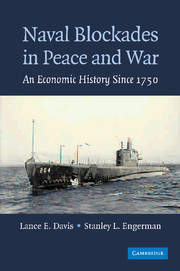Book contents
- Frontmatter
- Contents
- Preface
- 1 Introduction: “Thou Shalt Not Pass”
- 2 Britain, France, and Napoleon's Continental System, 1793–1815
- 3 The United States versus Great Britain, 1776–1815
- 4 The North Blockades the Confederacy, 1861–1865
- 5 International Law and Naval Blockades during World War I: Britain, Germany, and the United States: Traditional Strategies versus the Submarine
- 6 Legal and Economic Aspects of Naval Blockades: The United States, Great Britain, and Germany in World War II
- 7 The American Submarine and Aerial Mine Blockade of the Japanese Home Islands, 1941–1945
- 8 Blockades without War: From Pacific Blockades to Sanctions
- 9 Blockades, War, and International Law: What It All Means
- Conclusion
- Index
8 - Blockades without War: From Pacific Blockades to Sanctions
Published online by Cambridge University Press: 18 August 2009
- Frontmatter
- Contents
- Preface
- 1 Introduction: “Thou Shalt Not Pass”
- 2 Britain, France, and Napoleon's Continental System, 1793–1815
- 3 The United States versus Great Britain, 1776–1815
- 4 The North Blockades the Confederacy, 1861–1865
- 5 International Law and Naval Blockades during World War I: Britain, Germany, and the United States: Traditional Strategies versus the Submarine
- 6 Legal and Economic Aspects of Naval Blockades: The United States, Great Britain, and Germany in World War II
- 7 The American Submarine and Aerial Mine Blockade of the Japanese Home Islands, 1941–1945
- 8 Blockades without War: From Pacific Blockades to Sanctions
- 9 Blockades, War, and International Law: What It All Means
- Conclusion
- Index
Summary
BLOCKADES AND SANCTIONS
The laws of international relations deal with three broad categories of actions in response to disagreements among nations, or four, if one option is to do nothing and maintain the current situation. The three categories are: (1) amicable measures short of war; (2) nonamicable measures short of war; and (3) war. The first of these are formal understandings among nations designed to avoid warfare. They are usually based on some mutual agreement – the product of negotiations that could include mediation or arbitration. The second represents an attempt to avoid warfare through the adoptions of policies that impose a sufficiently high cost on the targeted nation that the target submits to certain terms to avoid military action. These policies – often termed “sanctions” – include measures of an economic, political, or diplomatic nature that are imposed unilaterally by one nation or by a coalition of nations. Among economic sanctions are Pacific blockades and various other forms of restrictions on trade, financial flows, and the movement of people. What types of sanctions to impose, and what their appropriate breadth and magnitude should be, are necessary questions that must be answered by any potential targeting nation (or nations); and the answers to those questions indicate the wide range of actions that are possible.
War involves a declared military action among two or more nations, although there remain questions of exactly what actions constitute a war and what the participants choose to call those actions.
- Type
- Chapter
- Information
- Naval Blockades in Peace and WarAn Economic History since 1750, pp. 383 - 416Publisher: Cambridge University PressPrint publication year: 2006

